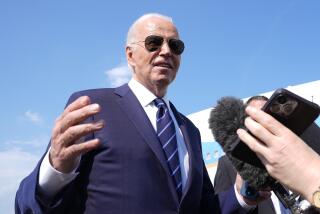A Blind Man? No, This President Is Clear-Eyed
- Share via
The breathless revelation from former Treasury Secretary Paul O’Neill that the president was disengaged at Cabinet meetings -- like “a blind man in a roomful of deaf people” -- reinforces the old stereotype that George W. Bush is a taco or two shy of a combination platter. And, in a way, the charge is warranted. Bush definitely must have been asleep on the job to have hired a whiny back-stabber like the former Alcoa chief as his Treasury secretary and have waited two whole years before canning him.
But this doesn’t make Bush any dumber than Bill Clinton, who appointed Les Aspin and Warren Christopher; or Ronald Reagan, who had Al Haig and Sam Pierce; or Jimmy Carter, who had Bert Lance; or Richard Nixon, who had William Rogers; or Lyndon Johnson, who had Robert McNamara. Every administration has a few Cabinet members who make you want to lock them in a cabinet and throw away the key.
Yet, though every president goofs, it seem that only Republicans have their IQ questioned. According to the conventional wisdom, Warren Harding and Calvin Coolidge were brainless Babbitts; Dwight Eisenhower was an amiable duffer; Gerald Ford was such a stumblebum that he couldn’t even walk straight; Reagan was an airhead actor; Bush the elder was a mealy-mouthed preppy; and now, Bush the younger is a clueless frat boy. Just about the only Republicans who escape the thick-as-a-plank stereotype are those, like Nixon and Herbert Hoover, who are seen as smart but sinister. Democrats, by contrast, are widely regarded as Mensa material. Clinton was a Rhodes scholar who loved to debate the details of welfare reform; Carter was a nuclear engineer and is a prolific author; Johnson was a legislative whiz; Kennedy hung out with artists and intellectuals.
The relationship between any of these stereotypes and reality is fairly tenuous. Kennedy projected a brainy image, but he spent his spare time reading Ian Fleming novels and emulating the amorous exploits of their protagonist. Eisenhower was a sharp thinker who cultivated the image of a doofus, often mangling his syntax deliberately to avoid taking a stand on a tough issue.
The larger point is that it doesn’t matter whether the president is a brainiac; what counts is whether he’s an effective executive. Woodrow Wilson was our only PhD president, but he was, in many respects, a failure. Carter may be a smart man -- though anyone who reads his poetry is apt to doubt it -- but he was a terrible manager. He famously spent time deciding who played on the White House tennis courts while the economy was tanking and the Soviets were overrunning Afghanistan. Clinton had the same problem: All that time spent in endless policy palaver distracted him from making tough decisions, which may help explain why Osama bin Laden ran wild in the 1990s.
By contrast, neither Reagan nor Eisenhower was an intellectual, but both were successful presidents because they were able to keep their eye on the big picture, make crisp decisions, delegate to subordinates and not get lost in policy minutiae. There was more than a little truth to the old “Saturday Night Live” sketch where Reagan acts like a doddering old man while meeting some schoolchildren, but, once the doors of the Oval Office are shut, he turns into a Machiavellian schemer barking orders to his aides.
George W. Bush is cut from the Eisenhower/Reagan cloth. Like them, he’s not doctorate material (although he does have a Harvard MBA), but he’s also not the dolt of popular repute. Slate has published two compilations of allegedly risible “Bushisms,” but it’s hard to know what’s so funny.
A typical quote: “[T]he best way to find these terrorists who hide in holes is to get people coming forth to describe the location of the hole, is to give clues and data.” OK, the syntax is a little convoluted, but the meaning is perfectly clear. That’s what happens with oral communication; not even Slate editors, I’m willing to bet, speak in perfect sentences.
That minor failing aside, does Bush have what it takes to be president? The last three years show that he does. Even those who don’t like anything he’s done have to concede that he’s been remarkably successful in enacting an ambitious agenda while winning the backing of roughly 60% of the public.
The conceit of the Bush bashers is that all this is because the president gets good advice, but, as former Bush speechwriter David Frum points out, advice doesn’t come in little boxes labeled “good” and “bad.” On every important issue, the president receives conflicting recommendations that he has to sort out. The best evidence of his wisdom is that he ignored his first Treasury secretary, who counseled against some of the tax cuts that have helped revive the economy.
More to Read
Get the L.A. Times Politics newsletter
Deeply reported insights into legislation, politics and policy from Sacramento, Washington and beyond. In your inbox twice per week.
You may occasionally receive promotional content from the Los Angeles Times.










